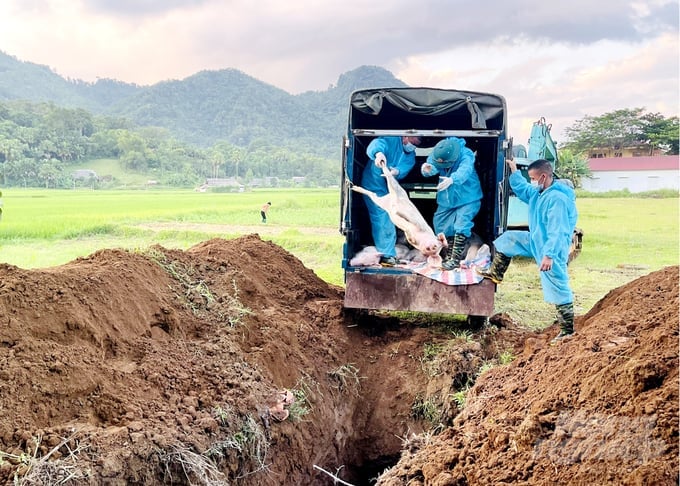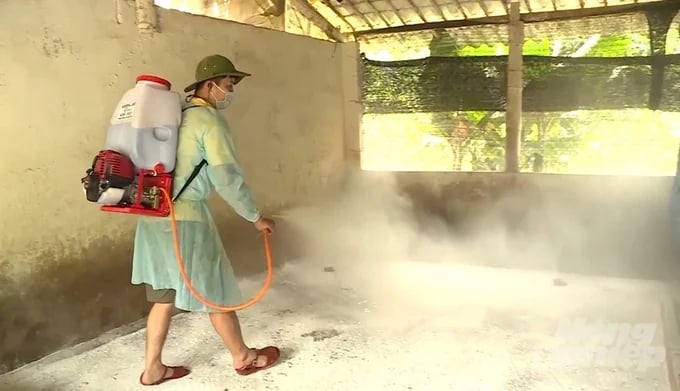May 30, 2025 | 11:21 GMT +7
May 30, 2025 | 11:21 GMT +7
Hotline: 0913.378.918
May 30, 2025 | 11:21 GMT +7
Hotline: 0913.378.918

Over 700 pigs infected with African swine fever in Ha Giang had to be destroyed. Photo: Dao Thanh.
According to the Ha Giang Department of Animal Husbandry, Veterinary and Fisheries, from September to early November, 708 pigs died in the province and were forced to be destroyed in 89 households/11 villages in Bach Ngoc, Viet Lam, Ngoc Minh communes and Vi Xuyen town. The total weight is over 21 tons.Immediately after discovering the appearance of an epidemic, the Ha Giang Department of Animal Husbandry, Veterinary and Fisheries coordinated with local authorities to implement a number of contents to prevent and contain African swine fever.
The Department also directly handle the outbreak on-site, destroys infected pigs and deploys epidemic prevention and control measures according to regulations; provides an extra support officer in Vi Xuyen district to combat the epidemic.
Immediately after the announcement of African swine fever, localities with epidemics destroyed all infected pigs. They also clean, disinfect and purify the entire outbreak area with lime powder and chemicals.
The total amount of chemicals used in the epidemic area was 184 litres and nearly 5 tons of lime powder was used to disinfect the outbreak areas, barn areas, burial pits and surrounding areas.
Ms Tran Thi Dai's family, Chung village, Viet Lam commune, Vi Xuyen district, had 5 market-ready pigs infected with African swine fever and had to be destroyed.
Ms. Dai said that on September 28, the family's herd of 5 pigs showed signs of losing appetite and appeared to have a rash. She informed the local authorities and it was confirmed that the pigs were infected with African swine fever.
To prevent the disease from spreading widely, Ms. Dai actively coordinated with the authorities to destroy the pig herd. After the extermination, her family immediately implemented disinfection measures to prevent the risk of disease spreading.

Over 20 days, Ha Giang has not recorded any pigs infected with African swine fever. Photo: Dao Thanh.
Since November 2, Ha Giang province has basically contained the epidemic and no infected cases have occurred.
Of these, 19 days have passed in Bach Ngoc commune and 18 days have passed in Ngoc Minh commune without any infected pigs; Vi Xuyen town has announced the end of the epidemic in the area; Viet Lam commune has gone 21 days without any infected pigs.
Faced with the above situation, the Ha Giang Agriculture and Rural Development sector requested the People's Committee of Vi Xuyen district to carry out general cleaning, disinfection and detoxification of the entire epidemic area and ensure compliance with regulations. These implementations prevent the epidemic from recurring and inspect and review with qualified localities to appraise and declare the end of the epidemic according to regulations.
Mr. Trinh Van Binh, Director of the Ha Giang Department of Animal Husbandry, Veterinary and Fisheries, said that up to now, there have been no pigs infected with African swine fever in the province. However, the Agriculture and Rural Development sector and local authorities still advise people to be aware of disease prevention, especially during the current seasonal transition period with many potential risks of disease outbreaks.
Currently, the entire Ha Giang province has nearly 595,000 pigs. In recent years, the outbreak of African swine fever has seriously affected the economic life of farmers in Ha Giang.
Therefore, to effectively prevent epidemics, in addition to the efforts and involvement of the government and functional agencies, people also need to raise their awareness, and strictly comply with epidemic prevention measures and sanitary cages according to procedures. This is to proactively control and prevent diseases that can recur and cause serious damage to the livestock industry.
Up to now, our country has had 2 types of ASFVA vaccines (NAVET-ASFVAC researched, produced and produced by NAVETCO Central Veterinary Medicine Joint Stock Company) and AVAC ASF LIVE - researched and produced by AVAC Vietnam Joint Stock Company). They are registered and issue a certificate of circulation in accordance with the provisions of the Veterinary Law and international technical standards for veterinary vaccines.
These are the first commercial ASF vaccines licensed for circulation, especially in the context that after more than 100 years, there has been no licensed commercial vaccine to prevent ASF in the world
Translated by Hoang Duy
/2025/05/25/4127-3-073637_820.jpg)
(VAN) Thanks to the promotion from an FAO-implemented project, vegetable production in greenhouses in Moc Chau has seen strong development, from 1.5 hectares in 2021 to nearly 50 hectares in 2024.

(VAN) FAO has recently supported USD 140,000 to implement the project 'Risk mitigation human-animal interface risks through disease control initiatives in pig farming.'

(VAN) The People's Committee of Tra Vinh province has approved an adjustment to the investment policy for the Green Hydrogen Plant project, increasing its area to approximately 52.76 hectares.
![Reducing emissions from rice fields: [2] Farmers’ commitment to the soil](https://t.ex-cdn.com/nongnghiepmoitruong.vn/608w/files/news/2025/05/05/dsc08881jpg-nongnghiep-140632.jpg)
(VAN) Clean rice cultivation model in Thuong Tan commune, Bac Tan Uyen district, is assisting local residents in achieving sustainable agriculture by substantially reducing costs, increasing productivity, and protecting the environment.

(VAN) At the conference to disseminate Resolution No. 68, AgriS introduced its digital agricultural ecosystem and reaffirmed its commitment to accompanying the Government in promoting private sector development and sustainable agriculture.

(VAN) 'Blue Ocean - Blue Foods' initiative is designed to restore marine ecosystems and establish sustainable livelihoods for local communities by cultivating a minimum of 1,000 hectares of cottonii seaweed in the first three years.
/2025/05/21/4642-3-112707_603.jpg)
(VAN) The V-SCOPE project has made direct contributions to three out of six pillars of the Comprehensive Strategic Partnership between Vietnam and Australia.